Those of you that have a great memory and/or excel in Chess Life Online trivia, will remember the article I wrote in 2010 about my experience playing a tournament in Vietnam.
Since then, the international chess bug has hit me, and I’ve played tournaments in Israel, Spain, France, and Argentina and have visited chess sites in India, Canada, England and Iceland. From these experiences, I have gathered five key takeaways regarding chess travel.1) Network!
Wherever I travel, there are three channels I use to network: chess, my Jewish background and music! When I traveled to Argentina in 2015, I met many new friends at a blitz tournament in Buenos Aires, attended Rosh Hashanah (New Year) and Yom Kippur (Day of Atonement) services at the Chabad of Palermo, and made a Brazilian acquaintance outside the Casa Rosada as we complemented each other on the Beatles shirts we were wearing. When I was in Colonia, Uruguay, I hobnobbed with a cosmopolitan crew made up of a girl from Australia, another from the Netherlands, a guy from Denmark, and yours truly, who was aptly nicknamed “Americano”. As I left them at a coffee shop to catch my bus to an estancia (ranch), deja vu happened as I stumbled across these two gentleman playing on the street: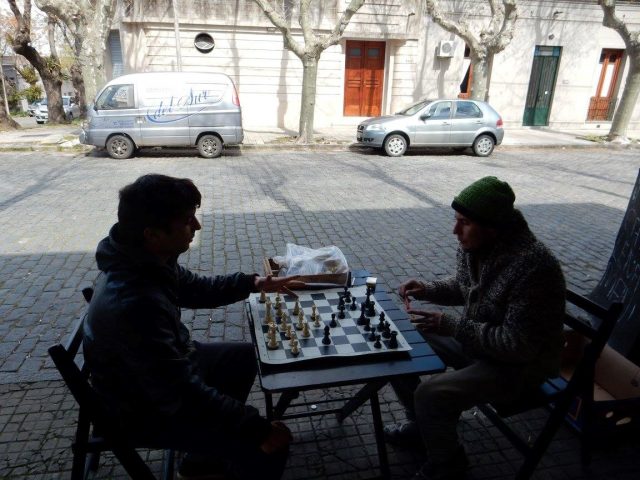 During my semester abroad at Tel Aviv University, my pal International Master Gabriel Battiglini, whom I got acquainted with New York, connected me to several of the chess organizers in Israel. As a result, I was able to play in several tournaments. In one rapid tournament, I defeated two IMs and tied for 2nd place.
During my semester abroad at Tel Aviv University, my pal International Master Gabriel Battiglini, whom I got acquainted with New York, connected me to several of the chess organizers in Israel. As a result, I was able to play in several tournaments. In one rapid tournament, I defeated two IMs and tied for 2nd place.
2) Play in FIDE tournaments at home.
When in Israel, Battiglini informed me of a norm tournament in Haifa. I was excited and spoke with the organizer, only for him to apologize as I couldn’t play because my FIDE rating was so low (around 1900 at the time). Having played me as a master at the Chess Center of New York’s “Four Rated Games Tonight”, Gabriel had assumed my FIDE was higher. Despite having performed well in his rapid tournament, the organizer had to politely inform me that by playing, I would ruin people’s norm chances. I then realized the importance of having a higher FIDE rating. Around the world, people do not care about US titles. Since then, I have neither cared about my US rating nearly as much nor played in many tournaments that are not FIDE rated. Playing FIDE tournaments at home is also important because of the subtle differences between FIDE and US Chess rules. Lack of knowledge, unfortunately, got the better of FIDE Master Leif Pressman when we were playing a tournament in Caguas, Puerto Rico in 2009. Pressman’s phone rang and was upset when the arbiter decided to forfeit him---He was used to US Chess Federation rules stating that you get a time penalty. I know he is still a little bitter about incident 8 years later, so, hopefully, he’s not reading this article. :)3) Plan early!
As Benjamin Franklin is famous for saying, “Failing to Plan is Planning to Fail.” Planning early enables you to ensure that you acquire the necessary visas. You are likely aware of the recent issues caused by the Israeli team not being able to get Visas for the World Rapid Championship in Saudi Arabia. That issue was unfortunately beyond the Israelis’ control. However, this is not the first time visas were problematic: In 2014, the FIDE President Kirsan Ilyumzhinov wrote an open letter to H.E Erna Solberg, Prime Minister of Norway regarding visa issues pertaining to the 2014 Olympiad. Visa issues will always happen, but one can minimize the risks by acquiring them as soon as possible. For each of my Israel, India and Vietnam visas, I needed to go to the respective embassy several times. You never know how long the bureaucracy can take. Especially during peaks times, traveling can quickly get expensive. US Chess Expert Adia Onyango does a great job at saving costs by making sure she brings enough food to last her throughout tournaments. Sometimes, I wonder why she is able to afford traveling the globe playing chess. Her deservedly titled Facebook nickname is “Chess Traveler”. In the past few years, she has traveled to play chess in Ireland, Norway, Sweden, and elsewhere. This collage of photos is of Adia playing in Sweden.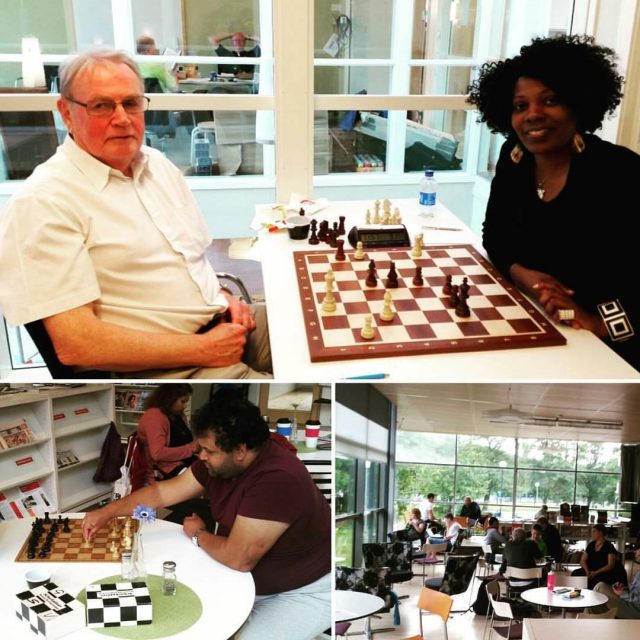 One can also save money by carefully planning to where to stay. Depending on the place and who you travel with, a hostel, Airbnb, or hotel may be the most cost effective---that is if you don’t have local friends to stay with. When I was in India for 10 days in 2015, I spent a whopping $45 on room and board the whole time. I stayed with a Brandeis University friend in Mumbai and a mutual acquaintance outside of Delhi in Gurgaon. I only stayed in a hostel for 2 nights while in Goa.
As a side note, while in India, I was shocked how well-known Viswanathan Anand is. He is a celebrity like Lebron James is in the United States---EVERYBODY knows him. Most non-chess players in the U.S could not tell you who Hikaru Nakamura, Wesley So, Fabiano Caruana, etc. are. Many will ask you if Bobby Fischer is still alive.
One can also save money by carefully planning to where to stay. Depending on the place and who you travel with, a hostel, Airbnb, or hotel may be the most cost effective---that is if you don’t have local friends to stay with. When I was in India for 10 days in 2015, I spent a whopping $45 on room and board the whole time. I stayed with a Brandeis University friend in Mumbai and a mutual acquaintance outside of Delhi in Gurgaon. I only stayed in a hostel for 2 nights while in Goa.
As a side note, while in India, I was shocked how well-known Viswanathan Anand is. He is a celebrity like Lebron James is in the United States---EVERYBODY knows him. Most non-chess players in the U.S could not tell you who Hikaru Nakamura, Wesley So, Fabiano Caruana, etc. are. Many will ask you if Bobby Fischer is still alive.
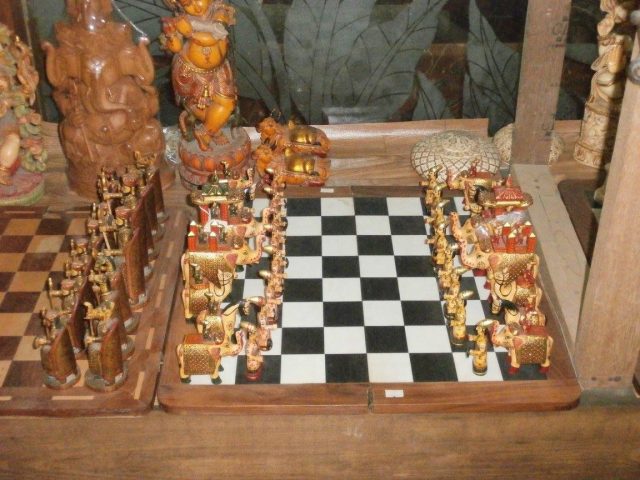 Fancy chess set in a rest stop on the way from Delhi to Agra
Fancy chess set in a rest stop on the way from Delhi to Agra 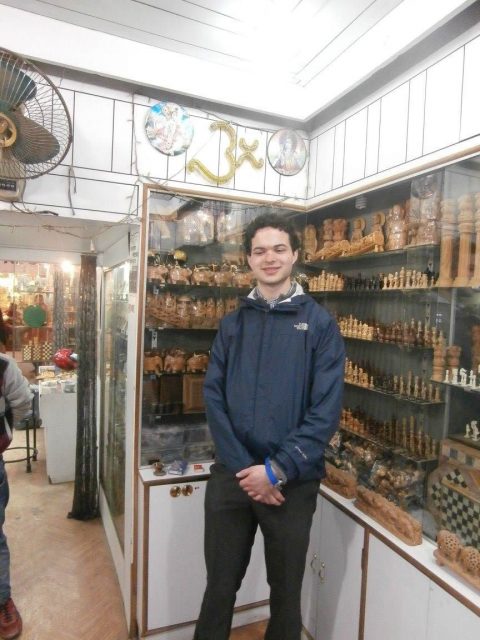 This is me in a chess store in the Red Fort in Delhi.
This is me in a chess store in the Red Fort in Delhi.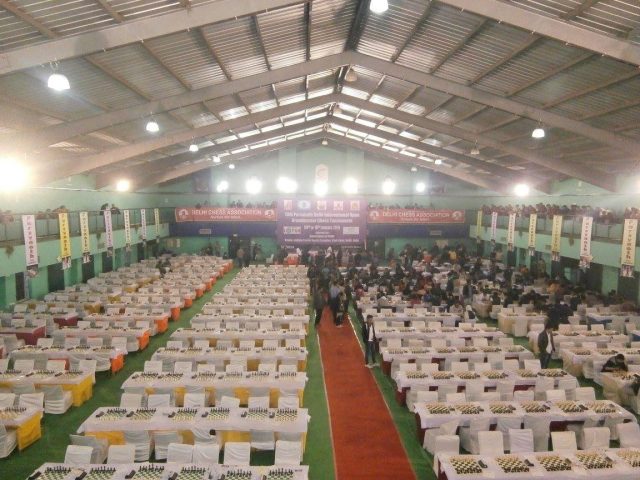 Playing hall of the 2015 Delhi International Open
Playing hall of the 2015 Delhi International Open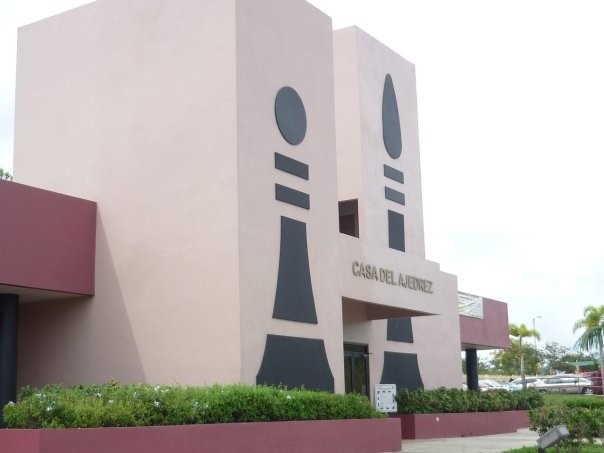 This is a picture of the gigantic Casa Del Ajedrez, where the tournament was held.
This is a picture of the gigantic Casa Del Ajedrez, where the tournament was held.4) Prepare your openings.
Now that we’ve discussed long-term planning, it's important to discuss the differences between American and European tournaments. Most tournaments in the U.S are 2+ games per day, which means if you are lucky you will have an hour or two in between rounds. Very often, you will have a only a few minutes and need to go and stuff a sandwich in your mouth before the next game. To the contrary, in Europe, most tournaments are one game per day, meaning you have about 24 hours to prepare for your opponents. The first few times I played abroad, preparation was a weakness as I never knew how to do research on my opponents and prepare my openings. I wish GM Mesgen Amanov wrote this helpful article, Path to the Podium many years prior! Follow his helpful steps, and you will succeed!5) Give back to community.
Perhaps the best thing about traveling, particularly when alone, is the ability to self-reflect. Having traveled in both developing countries (e.g., Vietnam, Cambodia and India) and in some of the most wealthy ones (e.g., Iceland, England and Belgium), my perception has often changed. When traveling in India, I thought I was a rich man when I found out that a day tour around the Taj Mahal and other sites would cost $100 or less. I thought quite the opposite when fast food meals in Iceland costed $15+. After all, one must remember the famous Beatles song “Can’t Buy Me Love”. Money is nice, but it does not make one happy. What is important is to be grateful for what you do have. When I was flying home from Mumbai in 2015, I made the grand decision that I would travel to at least one foreign country per year for the rest of my life. So far, I have accomplished that goal. In December 2016, I visited Iceland and even did the famous “chess player’s mecca."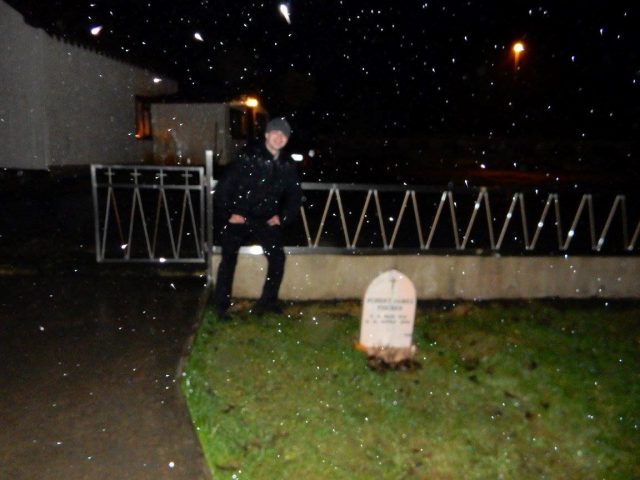 Despite what the picture depicts, this picture was taken at around 4:30 PM.
Despite what the picture depicts, this picture was taken at around 4:30 PM.Categories
Archives
- January 2026 (8)
- December 2025 (27)
- November 2025 (29)
- October 2025 (39)
- September 2025 (27)
- August 2025 (29)
- July 2025 (43)
- June 2025 (25)
- May 2025 (24)
- April 2025 (29)
- March 2025 (29)
- February 2025 (20)
- January 2025 (24)
- December 2024 (34)
- November 2024 (18)
- October 2024 (35)
- September 2024 (23)
- August 2024 (27)
- July 2024 (44)
- June 2024 (27)
- May 2024 (31)
- April 2024 (51)
- March 2024 (34)
- February 2024 (25)
- January 2024 (26)
- December 2023 (29)
- November 2023 (26)
- October 2023 (37)
- September 2023 (27)
- August 2023 (37)
- July 2023 (47)
- June 2023 (33)
- May 2023 (37)
- April 2023 (45)
- March 2023 (37)
- February 2023 (28)
- January 2023 (31)
- December 2022 (23)
- November 2022 (32)
- October 2022 (31)
- September 2022 (19)
- August 2022 (39)
- July 2022 (32)
- June 2022 (35)
- May 2022 (21)
- April 2022 (31)
- March 2022 (33)
- February 2022 (21)
- January 2022 (27)
- December 2021 (36)
- November 2021 (34)
- October 2021 (25)
- September 2021 (25)
- August 2021 (41)
- July 2021 (36)
- June 2021 (29)
- May 2021 (29)
- April 2021 (31)
- March 2021 (33)
- February 2021 (28)
- January 2021 (29)
- December 2020 (38)
- November 2020 (40)
- October 2020 (41)
- September 2020 (35)
- August 2020 (38)
- July 2020 (36)
- June 2020 (46)
- May 2020 (42)
- April 2020 (37)
- March 2020 (60)
- February 2020 (38)
- January 2020 (45)
- December 2019 (34)
- November 2019 (35)
- October 2019 (42)
- September 2019 (45)
- August 2019 (56)
- July 2019 (44)
- June 2019 (35)
- May 2019 (40)
- April 2019 (48)
- March 2019 (61)
- February 2019 (39)
- January 2019 (30)
- December 2018 (29)
- November 2018 (51)
- October 2018 (45)
- September 2018 (29)
- August 2018 (49)
- July 2018 (35)
- June 2018 (31)
- May 2018 (39)
- April 2018 (31)
- March 2018 (26)
- February 2018 (33)
- January 2018 (30)
- December 2017 (26)
- November 2017 (24)
- October 2017 (30)
- September 2017 (30)
- August 2017 (31)
- July 2017 (28)
- June 2017 (32)
- May 2017 (26)
- April 2017 (37)
- March 2017 (28)
- February 2017 (30)
- January 2017 (27)
- December 2016 (29)
- November 2016 (24)
- October 2016 (32)
- September 2016 (31)
- August 2016 (27)
- July 2016 (24)
- June 2016 (26)
- May 2016 (19)
- April 2016 (30)
- March 2016 (36)
- February 2016 (28)
- January 2016 (32)
- December 2015 (26)
- November 2015 (23)
- October 2015 (16)
- September 2015 (28)
- August 2015 (28)
- July 2015 (6)
- June 2015 (1)
- May 2015 (2)
- April 2015 (1)
- February 2015 (3)
- January 2015 (1)
- December 2014 (1)
- July 2010 (1)
- October 1991 (1)
- August 1989 (1)
- January 1988 (1)
- December 1983 (1)







